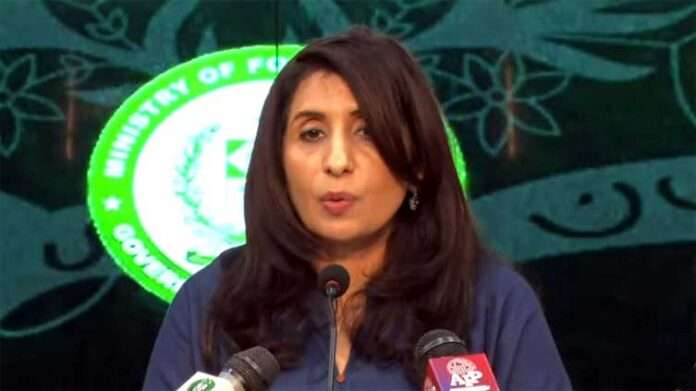The news of Indian involvement in an extrajudicial assassination in Canada, according to the Foreign Office of Pakistan, demonstrated on Wednesday that the nation’s network of extraterritorial executions had now expanded to a global scale.
Mumtaz Zahra Baloch, a spokesperson for the Foreign Office, stressed during the weekly press conference that India’s murder of a Canadian citizen on Canadian soil was a flagrant violation of international law and the UN’s concept of state sovereignty.
In answer to a query regarding Canadian Prime Minister Justin Trudeau’s assertion that he had “credible evidence” connecting the Indian government to the death of Sikh leader Hardeep Singh Nijjar, the spokeswoman made the comment.
Two masked assassins shot and killed 45-year-old Hardeep Singh Nijjar in Guru Nanak Sikh Gurdwara’s crowded parking lot in British Columbia, Canada.
As a “reckless and irresponsible act,” the incident was sharply condemned by the spokesman, casting doubt on India’s reputation as a trustworthy international partner and its ambitions for greater global responsibility.
In reference to India’s historical record, Mumtaz Baloch pointed out that the country’s Research and Analysis Wing (RAW) intelligence agency has long been actively involved in kidnappings and murders in South Asia.
The speaker emphasised that RAW-organised assassinations and spying have consistently targeted Pakistan. She recounted how, in December 2022, Pakistan had provided a thorough dossier including substantial and unflinching proof of Indian involvement in the June 2021 Lahore strike, claiming that “the attack was planned and executed by Indian intelligence.”
Mumtaz Baloch further said that in 2016, Commander Kulbhushan Yadhav, a top Indian military officer, admitted to his involvement in planning, funding, and carrying out terrorist and sabotage activities in Pakistan.
Regarding India’s allegations that Pakistan had participated in the Anantnag encounter, the spokesperson said that Pakistan has long maintained that India frequently accused Pakistan of participating in events that were under its control, particularly in occupied Kashmir.
Baloch noted that the primary channel of communication had decreased to the level of charge d’affaires, with the possibility of communication at the Director General Military Operations (DGMO) level if functional, in response to inquiries about diplomatic engagements between Pakistan and India at various levels.
The spokesperson for Pakistan’s caretaker government emphasised that Anwaarul Haq Kakar’s recent letter to the head of the Afghan government was merely ordinary correspondence in response to Afghanistan’s message of congratulations on the caretaker PM’s appointment.
In order to address shared concerns, Baloch highlighted the significance of maintaining diplomatic relations with Afghanistan.
The FO spokesperson emphasised Turkiye’s longstanding principled stance on the Jammu and Kashmir dispute, referred to Turkiye as an “old friend and brother” of Pakistan in response to Turkish President Recep Tayyip Erdogan’s support for the Kashmir cause, and suggested talks between Pakistan and India at the UN General Assembly.
Baloch expressed Pakistan’s readiness to hold negotiations with India to settle all differences, including the crucial Jammu and Kashmir problem. In addition, she reaffirmed Pakistan’s willingness to engage in third-party J&K dispute mediation based on UN Security Council resolutions and international law principles.
Mumtaz Baloch emphasised Pakistan’s resolve to voice its concerns regarding India’s support for state-sponsored terrorism in Pakistan and its mistreatment of the people of IIOJK. She drew attention to persistent human rights violations, including murders and arbitrary detentions.
Baloch restated Pakistan’s steadfast support for Azerbaijan’s sovereignty and territorial integrity in response to inquiries concerning Pakistan’s position on the Nagorno-Karabakh conflict, considering Karabakh to be a part of Azerbaijan’s sovereign territory.
When asked about caretaker PM Kakar’s attendance at the UNGA and his agenda, the spokeswoman disclosed that he was accompanied by a small entourage that comprised the foreign minister, foreign secretary, and other senior officials. The prime minister, according to her, would inform world leaders on Pakistan’s efforts to jumpstart the economic recovery and attract both domestic and foreign investment, as well as discuss a variety of regional and global issues, including the long-running unresolved Kashmir dispute.
Baloch stressed that foreign ambassadors in Pakistan were free to meet government officials and popular personalities, much like Pakistani ambassadors do in their respective home countries, in response to questions over the meetings of US Ambassador Donald A. Blome in Pakistan and his visit to Gwadar
Following a news report by a foreign newspaper, Baloch commented on Pakistan’s relations with Russia and said that both nations maintained active communication and frequent exchanges had occurred. She said that Pakistan’s stand on the Russia-Ukraine conflict was understood by Russia.






